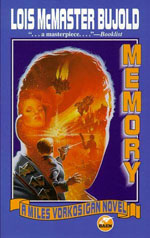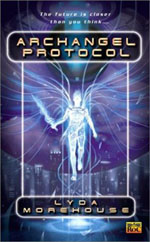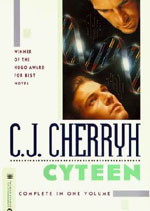 This is the fourth time I’ve read Bujold’s Memory. Needless to say, this is one of my personal favorites. It is, in fact, the work I consider to be Bujold’s finest: Containing every one of her myriad strengths, unmarred by the slightest flaw.
This is the fourth time I’ve read Bujold’s Memory. Needless to say, this is one of my personal favorites. It is, in fact, the work I consider to be Bujold’s finest: Containing every one of her myriad strengths, unmarred by the slightest flaw.
Both the heart and the plot of the book is revealed in the simplicity of its title: This is the story of a mid-life crisis – a transformative retrospective of memory and experience. Or, as Bujold pithily describes it in the series chronology at the back of the book, “Miles hits thirty. Thirty hits back.”
You would think that a narrative based on reminiscence would be a boring affair, but quite the opposite is true: Even while Miles’ journey is largely an introspective one, it remains — above all — a journey. There is a purpose to it, and Bujold crafts an internal action which is every bit as entertaining and well-paced as an external one.
And, in truth, Bujold spends only the balance of her time charting a course through the mind of Miles: Memory also quickly develops into an adventure of high intrigue and political espionage. (Once which, also, reflects the title – but in a way which could only be described by way of a spoiler.)
Of course, these two separate lines of action are carefully woven against each other: Action meets action. Developments in one predicate developments in the other. And so forth. Neither plot could exist without the other, and so — of course — both plots are, in fact, the same plot.
It is a further testament to Bujold’s mastery that Memory doesn’t stop there: Depending on how you count, there are at least four more sub-plots carefully developed. The method of counting matters because each of these sub-plots is juxtaposed and integrated into the greater narrative: Actions which may, at first glance, simply seem like random page-filling, weave themselves seamlessly into the primary plot itself.
Perhaps this is the secret which allows Bujold to make an introspective novel work so well: The nature of such a work would tempt a lesser author to include scenes devoid of purpose in the false belief that they “develop” or “flesh out” the character. Bujold simply refuses to let a scene pass without meaning. The plot is never allowed a moment’s rest, even when Miles is mired deep in memory. There is a clearly defined path here: Miles does not simply waffle from one caricature to another. Rather, he begins in one place and ends in another (with obstacles and struggles along the way, of course). There is real, meaningful growth — and it is fascinating to watch.
What else can be said here?
Of course, there is Bujold’s unique gift at crafting classic and memorable scenes. Some are brilliant touches of character. Others are chillingly horrific. Still others are simply shockingly imaginative.
The other thing which impresses me about Bujold is the subtlety with which the science fiction is woven into her narrative. I’ve often heard it said that Bujold’s work is character-heavy, but science-lite. I don’t find that to be true at all: Bujold just does an extraordinary job of integrating the science and technology into a cohesive world. In Memory, for example, you will encounter biotech, cybertech, personal flyers, advanced medical techniques, massive spaceships, domed cities, and a variety of terraforming techniques. But they aren’t highlighted and lit up with bright neon lights: They’re simply part of the world in which the characters live.
Bujold is also an author who does not believe in killing off her characters: That, after all, would be letting them off easily. A reader might get a moment of emotional catharsis by seeing a character die, but keeping them alive in the midst o an impossible situation provides a lot more entertainment in the long run. It’s the Oedipus Theory of dramatic convention: Oedipus committing suicide is nice. Oedipus jabbing his eyes out to blot out the horror of his life is better.
There’s a lot of eye-jabbing in Memory.
Also, watch out for the elephant. It’s pervasive.
GRADE: A+
Lois McMaster Bujold
Published: 1996
Publisher: Baen Books
Cover Price: $6.99
ISBN: 0-671-87845-X
Click here for a note to new Bujold readers.


 Cyteen
Cyteen 











